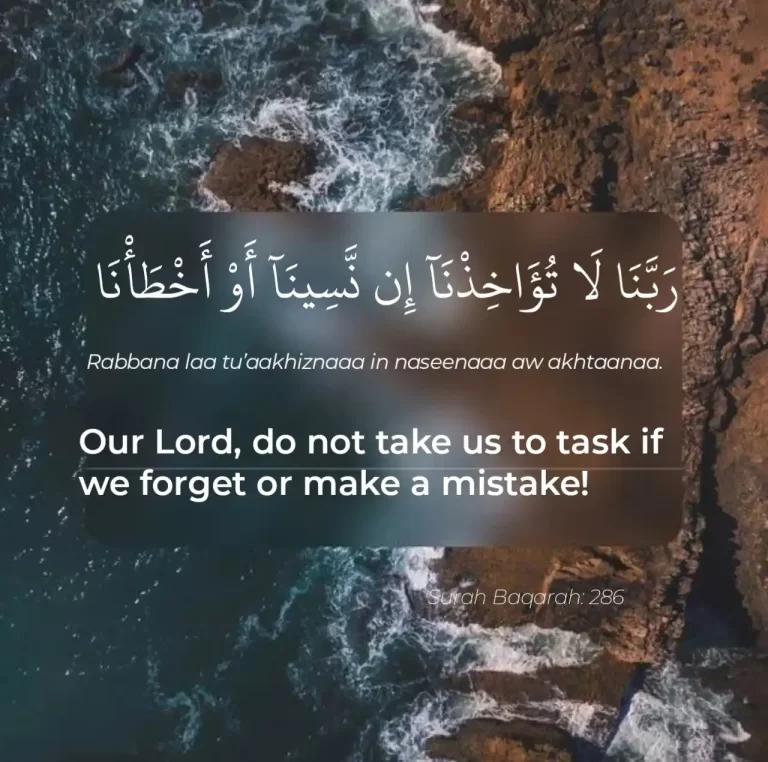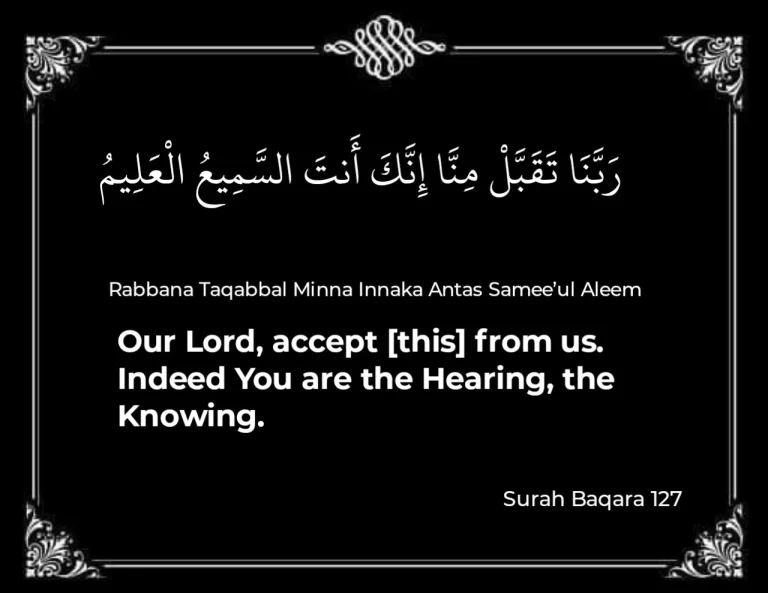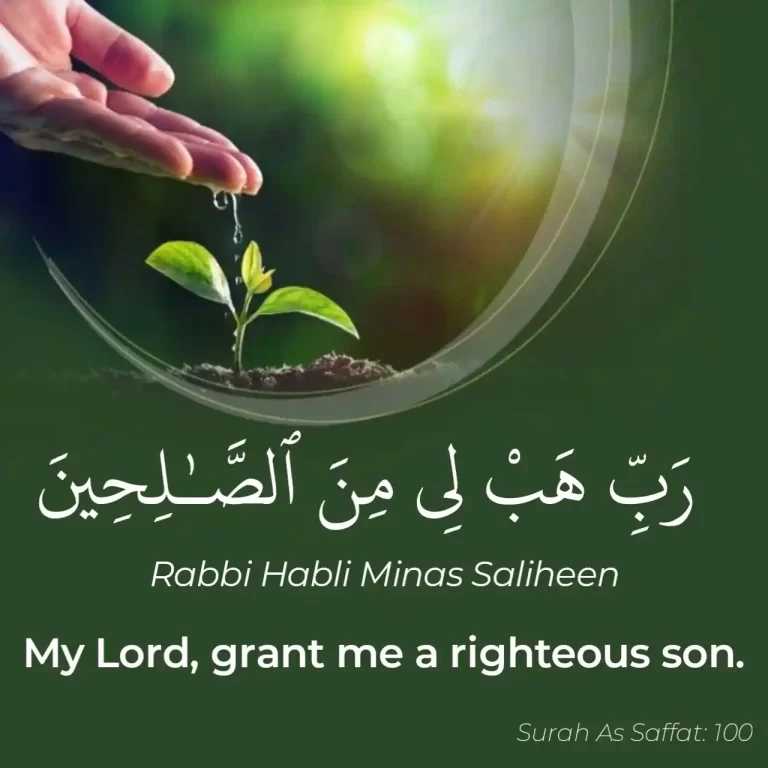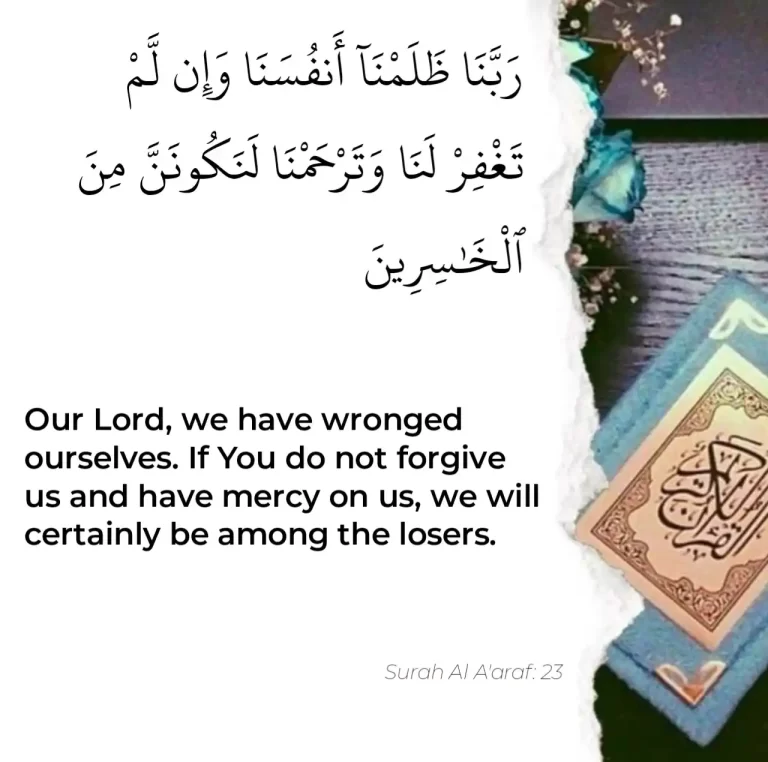Rabbighfirli Waliwalidayya Full Dua in Arabic and Meaning
In this blog post we will learn the meaning of Rabbighfirli waliwalidayya full dua in English, how it is written in Arabic, and commentary of the Dua. This supplication is mentioned in the Quran and is among the Duas for parents and seeking forgiveness.
Advertisements
Rabbighfirli Waliwalidayya Full Dua Meaning in English
The meaning of Rabbighfirlee Waliwalidayya is My Lord, forgive me and my parents and whoever enters my house a believer and the believing men and believing women. And do not increase the wrongdoers except in destruction.
Rabbighfirli Waliwalidayya Dua in Arabic
The full Dua is written in Arabic as:
رَّبِّ ٱغۡفِرۡ لِى وَلِوَٰلِدَىَّ وَلِمَن دَخَلَ بَيۡتِىَ مُؤۡمِنًا وَلِلۡمُؤۡمِنِينَ وَٱلۡمُؤۡمِنَٰتِ وَلَا تَزِدِ ٱلظَّٰلِمِينَ إِلَّا تَبَارًۢا
Rabbighfirli Waliwalidayya Waliman Dakhala Transliteration
Rabbi ighfir lee waliwalidayya waliman dakhala baytiya mu’minan walil mumineena wal muminati wala tazidiththalimeena illa tabara.
Advertisements

This is one of the Dua of prophet Nuh Alaihissalam. In the Holy Qur’an, Surah Nuh Verse #28, he asked Allah (SWT) for forgiveness for himself, his parents, and the believers.
My Lord! Forgive me, and my parents, and him who enters my home as a believer,
Ad-Dahhak said, “This means, my Masjid.”
However, there is no harm in understanding the Ayah according to its apparent meaning, which would be that he (Nuh) supplicated for every person who entered his house who was a believer.
Then he said, and all the believing men and women. He supplicated for all of the believing men and women, and that includes those of them who were living and those of them who were dead.
For this reason, it is recommended to supplicate like this, in following the example of Nuh, and that which has been reported in the narrations and well-known, legislated supplications.
Advertisements
SUGGESTED READING:
Rabbanagh Firlana Waliwalidayya Walil Mumineena Yauma in Arabic
رَبَّنَا ٱغۡفِرۡ لِى وَلِوَٰلِدَىَّ وَلِلۡمُؤۡمِنِينَ يَوۡمَ يَقُومُ ٱلۡحِسَابُ
Transliteration: Rabbana ighfir lee wali walidayya walil mumineena yawma yaqoomul hisab
Advertisements
Meaning: Our Lord, forgive me and my parents and the believers the Day the account is established.

This is similar Dua recited by Prophet Ibrahim Alaihissalam. In the Holy Qur’an, Surah Ibrahim Verse #41, Prophet Ibrahim asked Allah (SWT) for forgiveness for himself, his parents, and the believers.
Our Lord! Forgive me and my parents, Ibrahim said this before he declared himself innocent from his father, after he became sure that he was an enemy of Allah.
And the believers, all of them, on the Day when the reckoning will be established means on the Day when You will reckon Your servants and recompense or reward them for their deeds – good for good and evil for evil.
Source: Tafsir ibn Katheer
Importance of Seeking Forgiveness
Allah, may He be exalted, tells us that His Prophet Hood (peace be upon him) said to his people (interpretation of the meaning):
“And O my people! Ask forgiveness of your Lord and then repent to Him, He will send you (from the sky) abundant rain, and add strength to your strength, so do not turn away as Mujrimoon (criminals, disbelievers in the Oneness of Allah).”
Hood 11:52
And give you increase in wealth and children, and bestow on you gardens and bestow on you rivers.
Meaning, `if you repent to Allah, seek His forgiveness and obey Him, He will increase your provisions for you and provide you with water from the blessings of the sky.
He will cause the blessings of the earth and crops to grow for you. He will increase your live stock animals for you and give you more wealth and children.
This means that He will give you more wealth, more children and gardens with various types of fruits. He will cause rivers to flow among these gardens.
In fact, every Muslim needs to seek for forgiveness because no one is completely free from sins as reported in the hadeeth that:
The best of those who commit sin are those who regularly repent. No one is free from sins as stated by the Prophet SAW:
“All the children of Adam commit sin and the best of them are those who repent.”
The sin committed by the children of Adam may be falling short of an obligation or carrying out a prohibition.
You should emulate the Prophet SAW by doing a lot of Istighfaar as stated by Ibn Umar (may Allah be pleased with him):
“We counted the Messenger of Allah SAW saying a hundred times during one single sitting:
‘Rabbighfr’lee wa tubb alayyah, innaka anta tawwabur rahirri (meaning O my Lord! Forgive me and pardon me. Indeed, You are the Oft- Returning with compassion and Ever Merciful)
This great invocation is one of the noble invocations that Khalil al-Rahman invoked, in which he sought the greatest demands and objectives necessary for salvation in the Hereafter.
It is a request for forgiveness for himself and all believers, indicating a sublime indication of the compassion bestowed upon him, peace be upon him, for all believers.
His saying, “Our Lord, forgive me“: He singled himself out for forgiveness, and he prioritized it in supplication as an acknowledgment of it and a sense of falling short in what humans cannot escape.
His saying, “and for my parents“: He invoked forgiveness for them due to the greatness of their right upon him, as Allah said: “And say, ‘My Lord, have mercy upon them as they brought me up [when I was] small.'”
His saying, “and for the believers on the day the account is established”: meaning, cover the sins of the believers and overlook their faults on the day when the accountability of the responsible beings is established in the fairest manner possible, and there is no justice more perfect than Yours, our Lord.
In this blessed supplication lies great glad tidings for every believing man and woman regarding forgiveness, for Allah, the Most High, does not reject the supplication of His beloved in what he asks for.
This is also affirmed by the Prophet, peace be upon him, as narrated by Ubadah bin al-Samit: “I heard the Prophet, peace be upon him, saying: ‘Whoever seeks forgiveness for the believing men and believing women, Allah will record for him a good deed for each believing man and believing woman.'”
So, it is fitting for the servant to frequently make this comprehensive blessed supplication for every believer, male or female, from the time of Adam until the Hour.
Ibn Kathir, may Allah have mercy on him, said: “It is appropriate for every supplicant to pray for himself, his parents, and his offspring because they are part of his earnings and due to the immense favor they have upon him.”
Benefits:
- The importance of seeking Allah’s forgiveness as it is the key to safety and success in this world and the Hereafter. Khalil al-Rahman emphasized it in his supplication, and our Lord mentioned it for us to follow.
- The supplicant should allocate a portion of his supplication for his parents due to their immense rights and favors upon him.
- The great reward associated with this blessed and comprehensive supplication, as it is mentioned in the Quran and the Prophet, peace be upon him, affirmed its reward in numerous hadiths.
- The supplicant should include his brothers and sisters in faith in his supplications.
- The abundance of this supplication fosters love and enhances brotherhood among believers, aligning with the wise teachings of the Shariah.
- It is recommended for the supplicant to start with himself in his supplications, following the example of the Prophet, peace be upon him, who often began his supplications with self-request.
- The majority of the supplicant’s prayers should focus on matters related to the Hereafter.
- The significance of adhering to the supplications prescribed by the Shariah, as they encompass profound meanings and objectives that encapsulate the desires of this world and the Hereafter in concise and beautiful expressions.
Advertisements








3 Comments